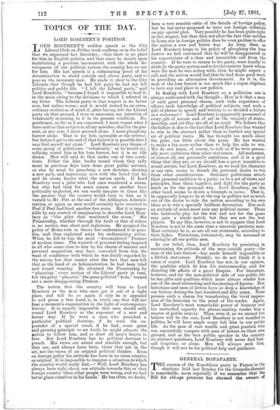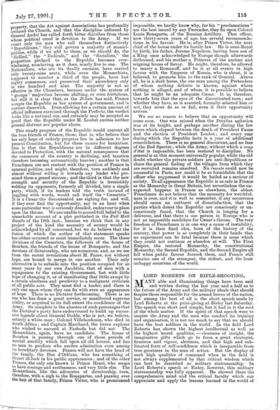GENERAL BONAPARTE.
THE success of the Republican party in France in the 1 elections held last Sunday for the Councils-General is remarkable, more especially if we remember that the Bill for old-age pensions has alarmed the owners of property, that the Act against Associations has profoundly irritated the Church, and that the discipline enforced by General Andr6 has called forth bitter diatribes from those whose political creed is devotion to the Army. If we count only the men who call themselves distinctively " Republicans," they still govern a majority of munici- palities, while if we add to them, as we should do, the Rallied, " the " Radicals," and the "Socialists," the proportion pledged to the Republic becomes over- whelming, numbering, as it does, nearly five to one. The Nationalists, who are its deadly enemies, have carried only twenty-nine seats, while even the Monarchists, supposed to number a third of the people, have lost eighty communes, and preserved their ascendency only in two hundred and nine. The majority is not so effective in the Chambers, because under the system of " groups " majorities become shifting, or even fortuitous, but still it is clear that, as the Debate has said, France accepts the Republic as her system of government, and is content therewith. Even allowing for a certain amount of official influence exercised through the Prefects, the verdict looks like a national one, and certainly may be accepted as proof that the Republic under M. Loubet excites neither general distrust nor popular alarm.
This steady progress of the Republic would content all the true friends of France, those, that is, who believe that her only hope of orderly progress lies in adhesion to her present Constitution, but for three causes for hesitation. One is that the Republicans are in different degrees devoted to Protection, with the natural consequence that the commerce of the country is declining, and taxation therefore becoming automatically heavier ; another is that Frenchmen are not content with the position of France in external politics, and might, therefore, turn suddenly and almost without willing it towards any leader who pro- mised them a grand success; and the third is that the new strength and security of the Republic is irresistibly welding its opponents, formerly all divided, into a single party, which, if its leaders told the truth instead of juggling with words, would call itself the " CEesarists." It is a Caesar the discontented are sighing for, and will, if they ever find the opportunity, say in an hour when some particular war is seriously dreaded, endeavour to place upon the throne. We are unable to accord full belief to the remarkable account of a plot published in the Pall Mall Gazette of the 19th inst., because we think that in any project of the kind the necessity of secrecy would be acknowledged by all concerned, but we do believe that the fusion of which the author of that statement speaks has either occurred or must immediately occur. The three divisions of the Csesarists, the followers of the house of Bourbon, the friends of the house of Bonaparte, and the devotees of dictatorship, who are numerous, and, as we see from the recent revelations about M. Faure, not without hope, are bound to merge in one another. Their only alternative is to subside into the position occupied for so many years by our own Jacobites, that of men with a repugnance to the existing Government, but with little hope of changing it, or of manifesting that little except by a certain aloofness and proclivity to a malignant criticism of all public acts. They must find a leader, and there is only one upon whom they can fix with even an appearance of hope. There is no Dictator forthcoming. There is no one who has done a great service, or manifested supreme ability, or acquired to its full extent the confidence of the Army. So complete is the absence of such personages that the Dictator's party have endeavoured to build up succes- sive legends about General Dodds, who is not, we believe, entirely a white man ; Colonel Villehardonin, who died in South Africa; and Captain Marchand, the brave explorer who wished to succeed at Fashoda but did not. The Monarchists, again, have no candidate. The house of Bourbon is passing through one of those periods of mental sterility which fall upon all old houses, and has no man to produce who excites admiration even among its hereditary devotees. France will not have the head of the family, the Due d'Orl6ans, who has something of Stuart ill-luck in his public appearances ; and of the other Princes, the only one known is Prince Henri, who seems to have courage and restlessness, and very little else. The Monarchists, like the advocates of dictatorship, turn, therefore, with a sigh to the Bonapartes, and passing over the heir of that family, Prince Victor, who is pronounced impossible, we hardly know why, for his " proclamations " are the best issued by any Pretender, they fix upon Colonel Louis Bonaparte, of the Russian Artillery. That officer, now thirty-seven years of age, has several recommenda- tions in his favour. He is, after Prince Victor, the next chief of the house under its family law. He is semi-Royal by birth, his father, Jerome Napoleon, having been son of a King once acknowledged by Europe though afterwards dethroned, and his mother a Princess of the ancient and reigning house of Savoy. He might, therefore, be allowed to marry a. Romanoff, and he is at all events in high favour with the Emperor of Russia, who is about, it is believed, to promote him to the rank of General. Above all, he is a dark horse, the one man among the Pretenders of whom nothing definite is known, against whom nothing is alleged, and of whom it is possible to believe that he might be an adequate Caesar. It is, therefore, towards him that the eyes of the discontented turn ; and whether they have, as is asserted, formally selected him or not, they must do so or fail, even if their opportunity arrives.
We see no reason to believe that an opportunity will come soon. One .was missed when the Dreyfus agitation was at its height, and perhaps another during the few hours which elapsed between the death of President Faure and the election of President Loubet ; and every year during which the Republic lasts is a year of additional consolidation. There is no general discontent, and no fear of the Red Spectre ; while the Army, without which a coup d'etat is impossible, has been restored to discipline. No general is at this moment universally popular, while the old doubt whether the private soldiers are anti-Republican or share the general feeling of the villages from which they are recruited remains unsolved. No &mute could now be successful in Paris, nor could it be so formidable that the officer who suppressed it would be hailed as a saviour of society. To all appearance the Republic is as safe in France as the Monarchy in Great Britain, but nevertheless the un- expected happens in France as elsewhere, the ablest Frenchmen do not believe that the necessity for watchful- ness is over, and it is well to remember, if any occurrence should cause an outburst of dissatisfaction, that the parties which detest the Republic are consciously or un- consciously fused, that the Church is longing for a deliverer, and that there is one person in Europe who is not an impossible candidate for Caesar's throne. The very freedom of Frenchmen is in one way a cause of instability, for it is their fixed idea, born of the history of the century, that power is so completely in their hands that no experiment can be fatal because there is none which they could not continue or abandon at will. The First Empire, the restored Monarchy, the constitutional Monarchy, the Second Republic, and the Second Empire all fell when public favour forsook them, and France still remains one of the strongest, the richest, and the least unhappy countries of the world.



































 Previous page
Previous page